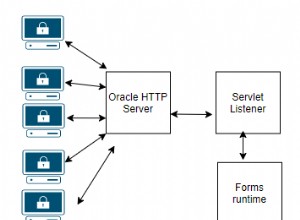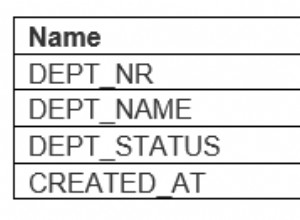Como está escrito en el comentario anterior, debe dividir y conquistar para hacer su vida más fácil (especialmente mientras escribe el código mientras juega con él en esa gran función). Eso funciona tan fácil como:
function file_put($number, $data)
{
$path = sprintf("C:/temp/wamp/www/file%d.txt", $number);
file_put_contents($path, $data);
}
por ejemplo, eso solo reemplaza las muchas líneas duplicadas donde solo necesita un archivo (numerado) en el que coloca una cadena.
Pero también puede hacer esto con cosas más complejas, como la operación de la base de datos. Probablemente desee quitar el manejo de errores de su vista, además de tener cuidado de conectarse a la base de datos cuando sea necesario y una forma más flexible de obtener los datos. Eso se puede hacer moviendo el (suavemente obsoleto) mysql_* funciona en una o dos clases propias, de modo que se pierde de vista. Eso hará que su uso sea mucho más fácil (lo cual muestro primero):
// Create your database object to use it later on:
$config = array(
'server' => 'localhost',
'name' => 'root',
'password' => '',
'db' => 'test',
);
$db = new MySql($config);
Llamé a la clase de base de datos MySql ya que representa la conexión mysql y funciona con la antigua extensión mysql. Solo necesita pasar ese objeto de la base de datos a la función en su pregunta. Combinado con el file_put función, se vería así:
function checkin(MySql $DB, $TechID, $ClientID, $SiteID)
{
$query = sprintf("SELECT `Type` FROM `Log` WHERE `TechID` = '%d' ORDER BY LogTime DESC LIMIT 1", $TechID);
file_put(5, $query);
$result1 = $DB->query("SELECT COUNT(*) FROM Log");
$result2 = $DB->query($query);
foreach ($result1 as $row1) {
list($count) = $row1;
$data = "ClientID:$ClientID TechID:$TechID SiteID:$SiteID Count:$count"
file_put(3, $data);
foreach ($result2 as $row2) {
file_put(4, $data);
}
}
}
Todavía el checkin La función está cerca de ser grande (12 líneas de código ya), pero es mucho más corta que su primera versión porque delega el trabajo para escribir los archivos y acceder a la base de datos. Espero que esta demostración sea útil. Lo que sigue es el ejemplo de código completo:
/**
* MySql Exception
*/
class MySqlException extends RuntimeException
{
}
/**
* MySql Database Class
*/
class MySql
{
private $server;
private $name;
private $password;
private $db;
private $connection;
public function __construct(array $config)
{
$this->server = $config['server'];
$this->name = $config['name'];
$this->password = $config['password'];
$this->db = $config['db'];
}
private function connect($server, $name, $password)
{
$this->connection = mysql_connect($server, $name, $password);
if (!$this->connection) {
$this->error("Unable to connect to '%s' as user '%s'", $server, $name);
}
}
private function select($db)
{
if (!mysql_select_db($db, $this->connection)) {
$this->error("Unable to select database '%s'", $db);
}
}
private function close()
{
$this->connection && mysql_close($this->connection);
}
private function connectSelect()
{
$this->connect($this->server, $this->name, $this->password);
$this->select($this->db);
}
/**
* @param $query
* @return MySqlResult
*/
public function query($query)
{
$this->connection || $this->connectSelect();
$result = mysql_query($query, $this->connection);
if (!$result) {
$this->error("Unable to execute query '%s'", $query);
}
return new MySqlResult($result);
}
/**
* @param string $format
* @param ...
* @throws MySqlException
*/
private function error($format)
{
$args = func_get_args();
array_shift($args);
$format .= ': %s';
$args[] = $this->connection ? mysql_error($this->connection) : mysql_error();
throw new MySqlException(vsprintf($format, $args));
}
public function __destruct()
{
$this->close();
}
}
/**
* MySql Result Set - Array Based
*/
class MySqlResult implements Iterator, Countable
{
private $result;
private $index = 0;
private $current;
public function __construct($result)
{
$this->result = $result;
}
public function fetch($result_type = MYSQL_BOTH)
{
$this->current = mysql_fetch_array($this->result, $result_type);
return $this->current;
}
/**
* Return the current element
* @link http://php.net/manual/en/iterator.current.php
* @return array
*/
public function current()
{
return $this->current;
}
public function next()
{
$this->current && $this->fetch();
}
/**
* Return the key of the current element
* @link http://php.net/manual/en/iterator.key.php
* @return mixed scalar on success, or null on failure.
*/
public function key()
{
return $this->current ? $this->index : null;
}
/**
* Checks if current position is valid
* @link http://php.net/manual/en/iterator.valid.php
* @return boolean The return value will be casted to boolean and then evaluated.
* Returns true on success or false on failure.
*/
public function valid()
{
return (bool)$this->current;
}
/**
* Rewind the Iterator to the first element
* @link http://php.net/manual/en/iterator.rewind.php
* @return void Any returned value is ignored.
*/
public function rewind()
{
$this->fetch();
}
/**
* Count of rows.
*
* @link http://php.net/manual/en/countable.count.php
* @return int The count of rows as an integer.
*/
public function count()
{
return mysql_num_rows($this->result);
}
}
// Create your database object to use it later on:
$config = array(
'server' => 'localhost',
'name' => 'root',
'password' => '',
'db' => 'test',
);
$db = new MySql($config);
function file_put($number, $data)
{
$path = sprintf("C:/temp/wamp/www/file%d.txt", $number);
file_put_contents($path, $data);
}
function checkin(MySql $DB, $TechID, $ClientID, $SiteID)
{
$query = sprintf("SELECT `Type` FROM `Log` WHERE `TechID` = '%d' ORDER BY LogTime DESC LIMIT 1", $TechID);
file_put(5, $query);
$result1 = $DB->query("SELECT COUNT(*) FROM Log");
$result2 = $DB->query($query);
foreach ($result1 as $row1) {
list($count) = $row1;
$data = "ClientID:$ClientID TechID:$TechID SiteID:$SiteID Count:$count";
file_put(3, $data);
foreach ($result2 as $row2) {
file_put(4, $data);
}
}
}
checkin($db, 1, 2, 3, 4);




